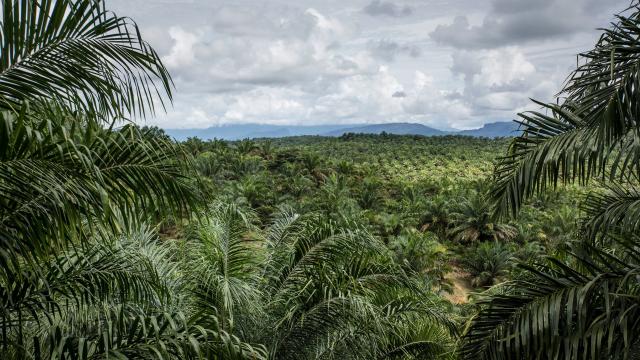Do you love Oreos? How about Pop-Tarts? Instant ramen?Â
All these snacks have become targets in the Rainforest Action Network’s (RAN) latest campaign against palm oil plantations. The organisation published an investigation Monday calling out major snack companies for their role in Indonesia’s deforestation crisis fuelled by rising demand for palm oil.
Nestlé, PepsiCo, General Mills and Hershey’s are among the companies the nonprofit alleges are likely sourcing their palm oil from deforested lands in the Rawa Singkil Wildlife Reserve, which is home to critically endangered species including the Sumatran tiger, Sumatran elephant and Sumatran rhino. Not only is this reserve home to rare creatures, it’s also home to an ancient peatlands swamp ecosystem that is an important carbon sink.
Unfortunately, these carbon-rich soil deposits are quickly becoming carbon sources, instead of carbon sinks due to deforestation.
That includes the Singkil-Bengkung region of Sumatra, Indonesia, the focus of Rainforest Action Network’s latest investigation. That’s troubling in the face of our worsening climate crisis ” and extremely relevant as Indonesia’s ongoing wildfires are turning skies red.
The organisation conducted field investigations at the beginning of this year, including interviews with the staff at some of the palm oil mills in question. Rainforest Action Network discovered one company in particular, CV. Buana Indah, was buying palm oil illegally grown on a site that was deforested in 2013.
The network then followed trucks carrying the palm oil to a nearby mill that PT. Global Sawit Semesta runs, which supplies palm oil to Golden Agri Resources and Musim Mas, major suppliers of palm oil. RAN also turned to transaction records to dissect the players in this complicated web of palm oil buyers and sellers.
Supply chains can be tricky. That’s what makes it so hard for companies to avoid conflict palm oil. Nestlé, for instance, pledged in 2010 to end deforestation in its supply chain by next year. Many other companies are also trying to make these commitments reality, Kemen Austin, a senior policy analyst at RTI International, told Gizmodo.
“They really are putting in the effort to walk the talk,” she said.
But doing so is hard. Suppliers can change season-to-season or year-to-year. And while companies can usually analyse mills pretty well, they can’t always get to the bottom of where the mills are purchasing their palm oil. As this investigation shows, doing so can require asking questions on-the-ground or secretly following around some shady arse trucks. One would expect these multinational corporations to have the resources to do this kind of work, though, especially if a nonprofit organisation was able to.
Rainforest Action Network doesn’t shy away from this point in its report:
“The fact that it takes an NGO-conducted investigation to expose that these major global brands are still actively sourcing Conflict Palm Oil from illegal sources, years after each of them has issued public policies explicitly committing them to stop sourcing from suppliers destroying rainforests and carbon-rich peatlands, signals a major failure of the implementation efforts conducted to date by these companies.
Consumer trust is understandably undermined when it is made clear that these multibillion-dollar international corporations continue to fail to make the investments and interventions needed to reform their palm oil supply chains to prevent this sort of egregious violations of their own promises from occurring.”
Consumers are the ones with the power to effect change in this area. Consumer awareness is why palm oil has gained so much attention already, said Austin. She suggested that snack lovers need to continue raising the alarm if they want to enjoy their goodies without the guilt of knowing their treats may be destroying key orangutan habitat. Ultimately, however, companies need to do better. The future of the planet depends on it.
